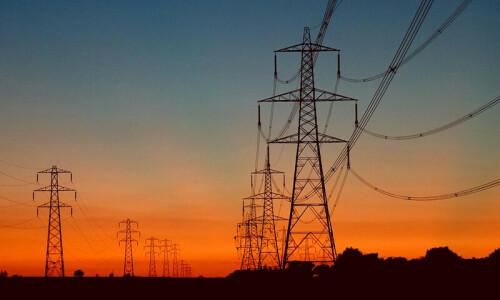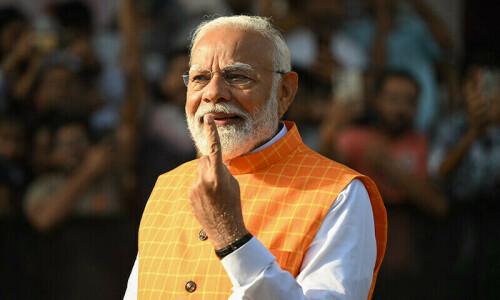• Hearing on Rs4.5 per unit hike for capacity charges concludes
• Charges imposed even as new connection applications remain pending
ISLAMABAD: Dissatisfied with power companies’ response to massive overbilling of consumers in July and August last year, the National Electric Power Regulatory Authority (Nepra) on Wednesday announced that it would hold distribution companies (Discos) accountable.
During a public hearing presided over by Nepra Chairman Waseem Mukhtar, the regulator expressed concern that the Discos were seeking over Rs85bn in recovery from consumers in three months, mainly as capacity charges. Meanwhile, applications for new connections that would utilise around 1,100MW in capacity remained pending.
Members were more flabbergasted over the managements of power companies, particularly chief executive Central Power Purchasing Agency (CPPA) for showing casual behaviour and poor preparedness in responding to questions during the hearing.
The hearing was convened to consider the Discos’ claim of another Rs85bn for the second quarter of the current fiscal year, to be charged to consumers nationwide at the rate of about Rs4.5 per unit for three months.
Nepra’s case officers reported a 12-13 per cent decline in electricity consumption during the fortnight. Nepra members expressed displeasure over the absence of CEO of CPPA and the power division for not attending the public hearing when their questions about the reason behind decline in consumption in areas other than industrial sector.
Nepra member Rafique A. Shaikh said the load-shedding was taking place across the country, and consumers were bearing the heavy cost of capacity payments, yet power companies were not showing interest in extending new connections. The hearing was told that pending application for new connections were equivalent to 1,100MW.
Nepra chairman said it was a matter of serious disappointment that questions raised during the hearing remained unanswered. He said the regulator had facilitated the power companies and consumers through online public hearing, but the CEOs of power companies were even unavailable online while their petitions were being heard.
He directed that CEOs of power companies should personally and physically attend the next hearing, and the alternate staff, in the absence of a CEO, should be well-prepared.
The regulator said the responses from the distribution companies over excessive billing, as established in an investigation report, were unsatisfactory and it had now decided to issue formal show-cause notices within a couple of days. It said the matter would be concluded within a month. It may be recalled that an investigation team had found the Discos to be overcharging consumers to the extent of 100pc in July-August 2023 through extended billing cycles etc.
In their separate tariff petitions, the Discos had sought to raise about Rs85bn from their consumers over the next three months under quarterly tariff adjustment (QTA) for the Oct to Dec 2023 period. This is also on top of about Rs6.5 per unit monthly fuel cost increase for the billing month of Feb, which is currently pending a decision by the regulator.
The quarterly adjustments for Discos are now automatically applicable to KE’s consumers, as well as per recent decisions of the government and the regulator.
The increase had been sought by the Discos to finance the additional financial impact of capacity charges arising out of currency devaluation and interest rate hike, besides the market operator fee, the impact of transmission and distribution losses on fuel cost adjustments, the cost of incremental consumption and variable operation and maintenance charges for the second quarter of the current fiscal year.
At present the consumers are paying about Rs3.28 per unit QTA for 4th quarter of the last fiscal year, which will remain applicable for six months — October 2023 to March 2024 — so as to mop up more than Rs200bn across the country, including K-Electric. Another QTA for July-Sept 2023 is also being charged to consumers at the rate of Rs1.15 per unit for the billing period of Jan to March 2024 to raise another Rs22.3bn.
The biggest chunk of additional cumulative burden on account of capacity charges has been claimed by Discos at Rs78bn for the quarter, followed by Rs11bn on account uncovered impact of transmission and distribution losses and Rs6.6bn on account of use of service charges and market operator fee. On the other hand, Discos have offered Rs8.7bn worth of negative variable O&M charges and Rs2.34bn of impact of incremental sales, thus working out a cumulative net additional demand of Rs85bn.
Upon approval, the adjustment would be recovered on uniform basis from all consumers except for lifeline users. Under the tariff mechanism, changes in fuel cost are passed on to consumers only on monthly basis through automatic mechanism, while quarterly tariff adjustments on account of variation in power purchase price, capacity charges, variable operation and maintenance costs, use of system charges and including impact of transmission and distribution losses are built in the base tariff by the federal government.
Published in Dawn, February 15th, 2024












































